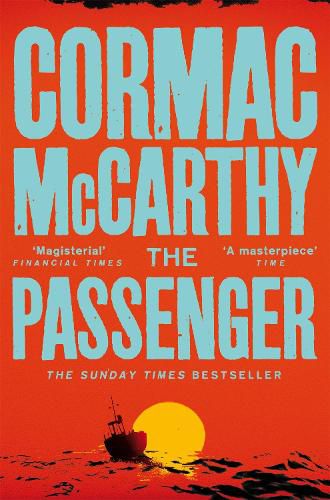Readings Newsletter
Become a Readings Member to make your shopping experience even easier.
Sign in or sign up for free!
You’re not far away from qualifying for FREE standard shipping within Australia
You’ve qualified for FREE standard shipping within Australia
The cart is loading…






1980, PASS CHRISTIAN, MISSISSIPPI: It is three in the morning when Bobby Western zips the jacket of his wetsuit and plunges from the boat deck into darkness. His divelight illuminates the sunken jet, nine bodies still buckled in their seats, hair floating, eyes devoid of speculation. Missing from the crash site are the pilot's flightbag, the plane's black box, and the tenth passenger. But how? A collateral witness to machinations that can only bring him harm, Western is shadowed in body and spirit - by men with badges; by the ghost of his father, inventor of the bomb that melted glass and flesh in Hiroshima; and by his sister, the love and ruin of his soul.
Traversing the American South, from the garrulous bar rooms of New Orleans to an abandoned oil rig off the Florida coast, The Passenger is a breathtaking novel of morality and science, the legacy of sin, and the madness that is human consciousness.
$9.00 standard shipping within Australia
FREE standard shipping within Australia for orders over $100.00
Express & International shipping calculated at checkout
1980, PASS CHRISTIAN, MISSISSIPPI: It is three in the morning when Bobby Western zips the jacket of his wetsuit and plunges from the boat deck into darkness. His divelight illuminates the sunken jet, nine bodies still buckled in their seats, hair floating, eyes devoid of speculation. Missing from the crash site are the pilot's flightbag, the plane's black box, and the tenth passenger. But how? A collateral witness to machinations that can only bring him harm, Western is shadowed in body and spirit - by men with badges; by the ghost of his father, inventor of the bomb that melted glass and flesh in Hiroshima; and by his sister, the love and ruin of his soul.
Traversing the American South, from the garrulous bar rooms of New Orleans to an abandoned oil rig off the Florida coast, The Passenger is a breathtaking novel of morality and science, the legacy of sin, and the madness that is human consciousness.
It is more than 15 years since Cormac McCarthy’s last novel was published, and for those of the faith the reward is rich indeed. Not one, but two novels published simultaneously in this, his 89th year.
In The Passenger, protagonist and salvage diver Bobby Western uncovers a mystery while on assignment: a small passenger jet submerged in the murky waters around New Orleans, all passengers deceased and present at the scene bar one who is missing. Also missing is the aircraft’s black box flight recorder. Bobby’s suspicion of conspiracy is further aroused by the appearance of mysterious agents who pursue and hector him, ransacking his home, all without explanation.
New Orleans is perhaps the perfect environment from which emerges a host of fabulous characters: a flamboyant and erudite counterfeiter; a glamorous trans stage performer; a clairvoyant private investigator (who offers compellingly credible testimony on the subject of the Kennedy assassination). It is a miscellany of societal oddments, all drawn into the knotty thread by Bobby’s taciturn charisma.
Bobby is somewhat of a mathematical wunderkind, eclipsed by the genius of his younger sister, Alicia, who was admitted to the University of Chicago at the age of 13. Upon recognition of his sister’s superiority, Bobby transferred his attention to the study of physics. It seems Bobby is genetically predisposed since their father was a critical player in the Manhattan Project.
Bobby and Alicia’s relationship is a complex one. Their love for one another is all-consuming yet unconsummated. The prologue informs us of her death by suicide that Bobby cannot and will not reconcile. The high-concept, deeply theoretical sphere of advanced mathematics and physics makes a perfect firmament for these two characters, whose abiding love cannot be countenanced by society. Hence, Bobby engages in high- risk pursuits such as Formula 2 race car driving, and of course salvage diving.
In the present, Bobby’s mystery is compounded by unexplained deaths and spectral visitations. The IRS seizes his car, and freezes his bank accounts. Surely the mysterious agents’ activities cannot be explained by something so banal as income tax delinquency. Bobby lights out for the territories, wintering in an abandoned farmhouse in Idaho, enduring bitter cold and undernourishment. He makes his way to the psychiatric facility of Stella Maris, seeking some closure before his return to New Orleans where he must speculate on his perilous future.
While The Passenger is less bloodthirsty than many of McCarthy’s novels, it is certainly still dark. Yet it also offers more humour than any other McCarthy book that I can recall, and as the author informs us, every theatre has a ghost light, so it is never completely dark.
Stella Maris is presented as a coda to The Passenger. In essence, it is a transcript of psychiatric sessions with Alicia Western at the facility to which she had herself committed. The Passenger introduced us to The Thalidomide Kid, an ectromelic phantasm of Alicia’s own device, and while Stella Maris offers more detail on this vaudevillian homunculus with a penchant for malapropisms and misquotation, it more importantly fleshes out Alicia’s tragic relationship with Bobby.
Centrally, however, Stella Maris is focused on Alicia’s ruminations on unanswerable questions through the prismatic spectra of great thinkers such as Kant, Schopenhauer and Wittgenstein, sharpened in focus by the forensic lens of a mind trained in the pursuit of absolutes.
See what the Readings’ team have to say on the blog, discover related events and podcast episodes.